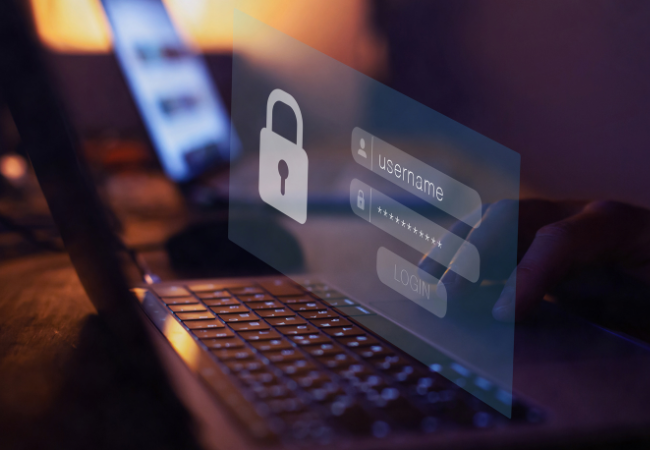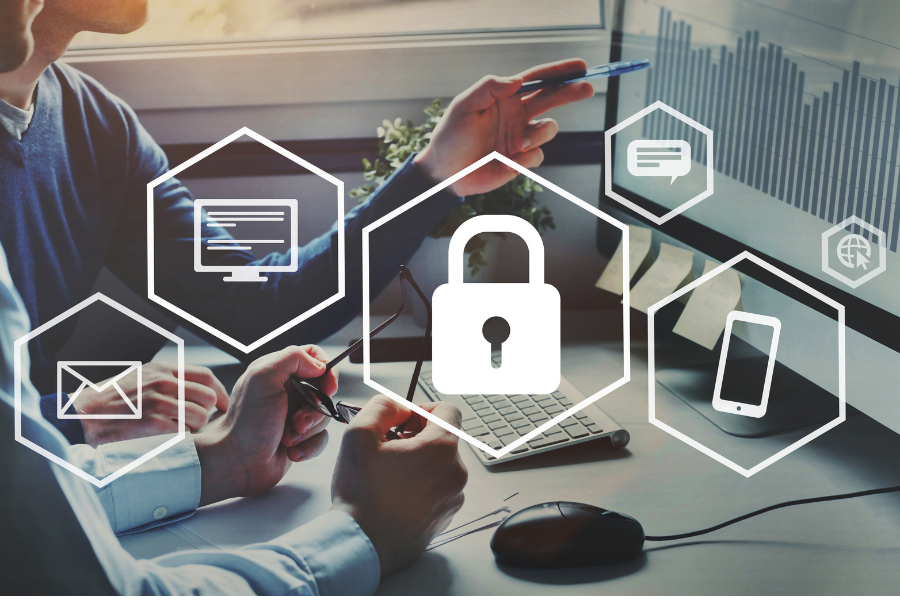The International Executive MBA is designed to solve the most critical challenges faced by leaders like you in a globalised and constantly changing business env
 Blog
BlogThe importance of cybersecurity in the digital world
This article by Juan Guido Gabaglia discusses the importance of cybersecurity in the current context. Gabaglia, founding partner and current head of the production and commercial department at AGE2 Business Datacenter in Murcia, shared his experience and vision on the challenges and risks associated with cybercrime.
The National Institute of Cybersecurity (INCIBE) understands cybersecurity as ‘cyber mechanisms and practices that serve to protect our devices and our security and privacy when we surf the net’. Based on this definition, we understand that in the digital era, cybersecurity is essential to protect the personal information and electronic systems of companies and individuals.
On the other side of the coin is cybercrime or cybercrime. That is, malicious attacks that affect both mobile devices and computer systems. Through techniques such as social engineering, cybercriminals manage to obtain information and steal sensitive data, which poses serious IT security challenges.

Consequences of cyber attacks: costs of IT security in Spain
In Spain, cyber attacks have generated costs in the millions in recent years. National companies face financial losses, but also reputational damage, decreased productivity and disruption of operations. The consequences of these attacks include the theft of confidential information, fines for non-compliance with cybersecurity regulations and a loss of customer confidence. In addition, the security and protection of the country's critical infrastructures, such as telecommunications or energy, are also affected.
As mentioned, cyber-attacks can have a devastating impact on both individuals and businesses. Leakage of confidential data can lead to identity theft, financial fraud and privacy violations. In addition, attacks can disrupt the operation of critical systems, such as those that run essential services in education, government and healthcare.
To ensure national security and protect citizens, it is vital that both government and business implement measures to detect and respond to potential risks.
Cybersecurity and data protection measures
Network security encompasses a number of aspects including the protection of connected devices and the implementation of strong passwords. In addition, it is essential to raise awareness on issues such as email and social media management, where authorised users must be trained to prevent unauthorised access.
Another key factor is the adoption of technologies such as multi-factor authentication and the implementation of zero trust policy to minimise the risk of attackers gaining access to operating systems and computer systems. All in all, we can say that cyber security is based on three fundamental pillars:
- Integrity: this refers to the protection of information against unauthorised modification. This involves ensuring that data is not altered during storage or transmission and that only authorised persons can make changes.
- Confidentiality: involves keeping information secure and limiting access to only authorised persons. This is achieved by encrypting data and establishing appropriate access policies.
- Availability: refers to ensuring that systems and services are available when needed. This involves having measures in place to protect against potential disruptions, such as backups and server redundancy.
These principles ensure that personal and corporate data are protected against unauthorised modification, improper access and possible service interruptions. In addition, the deployment of malware as part of an attack can disrupt the integrity of systems, putting both personal information and business continuity at risk.

Role of senior management and cyber security standards
Senior management plays a crucial role in ensuring that effective cyber security policies and measures are in place. These policies include allocating resources for disaster recovery, hiring specialised staff and investing in advanced technological tools such as artificial intelligence.
At the institutional level, both in Spain and in the European Union, there are regulatory frameworks such as ISO 27001 and the NIST Cybersecurity Framework, which help organisations to effectively manage the risks associated with digital security.
National cybersecurity organisations
In Spain there are several national organisations and agencies in charge of promoting and ensuring cybersecurity in the country. Some of the most prominent are the following:
- INCIBE (Instituto Nacional de Ciberseguridad): this is the reference entity in cybersecurity in Spain. It is responsible for the detection, response and coordination of cyber-incidents, as well as cybersecurity awareness and education.
- CCNCERT (National Cryptologic Centre): is the entity in charge of guaranteeing security in the communications and information systems of the Spanish Government.
- CNPIC (National Centre for Critical Infrastructure Protection): responsible for protecting critical infrastructures and guaranteeing cybersecurity in strategic sectors such as energy, telecommunications and transport.
Laws and regulations in Spain
In our country there are also different laws and regulations that are in charge of protecting data security and privacy, as well as guaranteeing security in information systems and in the field of private security. Some of the most important laws in this field are:
- Data Protection Act (LOPD): its main objective is to guarantee and protect the fundamental rights of individuals with regard to the processing of their personal data. This law establishes the duties and obligations to be fulfilled by public and private entities that handle personal data.
- Information Systems Security Act (LSSI): seeks to protect the integrity, availability and confidentiality of information stored in computer systems. This law establishes security measures that companies and organisations must implement to prevent cyber-attacks and protect sensitive information.
Private Security Law: regulates the exercise of private security in Spain. This law establishes the requirements and obligations that security companies must comply with, as well as the rights and duties of professionals working in this field. Its main objective is to guarantee the security and protection of goods, establishments, shows and events.

Spanish law is responsible for protecting data security and privacy,
Career opportunities and the future of cybersecurity
With the rise of digital transformation and the growth of the interconnected world, industrial cybersecurity has become crucial. Career opportunities in this field are booming, and cyber security experts play a key role in protecting digital products and services.
Advances in standards and technology, as well as the implementation of best practices in identity and access, are fundamental to ensuring safety and security in the digital world. However, there is something else: continuous and specialised education: it is essential to keep up with changes and adapt; and of course, it presents itself as a job opportunity with a very high employability rate.


Agri-food is a strategic sector for both the national and international economies.



A company or organization that anticipates, identifies needs and threats, foresees, and makes strategic and operational decisions based on Comprehensive Risk Management



In ENAE Business School's Official Master in Logistics and Operations Management program, you will learn how to analyse the performance of a company's operation

Business decision-making can no longer be based on intuition.


Automated Marketing Reports: From ‘Excel paralysis’ to real ROI (Guide with Power BI, Looker and Tableau Templates)

Master's Degree in Logistics in Spain: Key Factors for Choosing a Leading Program
Daniel Román Barker
Marketing Specialist at ENAE Business School, where he is part of the team responsible for planning, producing and optimising digital content for the enae.es and enae.com websites, as well as for the school's various social media channels. Using the Drupal CMS, he manages the publication and updating of pages and articles, ensuring brand consistency, content quality and user experience.
He specialises in SEO and performance marketing, defining and implementing the organic content strategy with the support of tools such as Sistrix and Google Search Console to improve positioning and qualified traffic to master's programmes and executive courses. In addition, he designs, configures, and optimises online advertising campaigns on Meta, LinkedIn, TikTok, and Google Ads, aligning segmentation, messaging, and objectives with student recruitment. His work contributes to ENAE's organic and paid growth and strengthens its position as a leading business school nationally and internationally.













